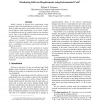Free Online Productivity Tools
i2Speak
i2Symbol
i2OCR
iTex2Img
iWeb2Print
iWeb2Shot
i2Type
iPdf2Split
iPdf2Merge
i2Bopomofo
i2Arabic
i2Style
i2Image
i2PDF
iLatex2Rtf
Sci2ools
104
click to vote
HICSS
2002
IEEE
2002
IEEE
Monitoring Software Requirements Using Instrumented Code
Ideally, software is derived from requirements whose properties have been established as good. However, it is difficult to define and analyze requirements. Moreover, derivation of software from requirements is error prone. Finally, the installation and use of compiled software can introduce errors. Thus, it can be difficult to provide assurances about the state of a software's execution. We present a framework to monitor the requirements of software as it executes. The framework is general, and allows for automated support. The current implementation uses a combination of assertion and model checking to inform the monitor. We focus on two issues: (1) the expression of “suspect requirements”, and (2) the transparency of the software and its environment to the monitor. We illustrate these issues with the widely known problems of the Dinning Philosophers and the CCITT X.509 authentication. Each are represented as Java programs which are then instrumented and monitored.
Biometrics | Error Prone | HICSS 2002 | Requirements | Software |
Related Content
| Added | 14 Jul 2010 |
| Updated | 14 Jul 2010 |
| Type | Conference |
| Year | 2002 |
| Where | HICSS |
| Authors | William N. Robinson |
Comments (0)

